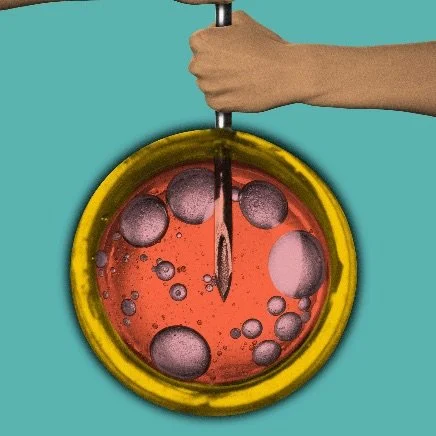RRM by any other name…
Restorative Reproductive Medicine (RRM): Why you should be skeptical
If only it were so straightforward and easy.
Proponents of Restorative Reproductive Medicine (RRM) want you to believe that infertility is simply a matter of lifestyle — not biology, not access, not systemic barriers. They’re pushing this dangerous narrative by aligning with the rising “trad wife” influencer trend, especially within the MAHA movement, using glossy Instagram aesthetics to promote unproven “treatments.” Behind the scenes, these influencers, drawn in by profit and platform growth, may not even realize they’ve become pawns in the far-right’s larger mission: to redefine infertility care in ways that align with an ideological agenda — one that ultimately seeks to eliminate frozen embryos, restrict access to IVF, and control the way families are formed.
Ah, yes, so here we are back to that old adage that if you just relax, meditate and get more sleep you’ll get pregnant. It’s akin to know-it-alls who tell you that if you just cut down your calories and exercise more, you will lose weight. Uh-huh, right.
Well, folks, as you would guess, it’s far from being that simple.
What exactly is “restorative reproductive medicine” (RRM) in the first place? (It doesn’t even have a Wikipedia entry and leading doctors have never heard of it, if that tells you anything). RRM is defined as being a “comprehensive approach” that focuses on “identifying and correcting the underlying causes” versus “simply treating symptoms.” It claims to use a holistic approach that includes emphasis on natural menstrual cycles and addressing things like inflammation and lifestyle factors. Part of that is helping women understand (!) their reproductive cycles and helping women identify “optimal times” for conception. (Does this reek of mansplaining to you? Yep, us too).
If you read our newsletter last week, we pointed out that RRM is not recognized by leading medical authorities and lacks scientific validation. First of all, RRM does not acknowledge male-factor infertility nor unexplained infertility, and it puts the “blame” solely on women if they cannot get pregnant. There is also the implication that women can somehow “fix” their infertility and that women do not have “adequate information” about their reproductive health. RRM is not about comprehensive medically accurate reproductive health information but rather trying to “educate” women on increasing their chances for pregnancy.
RRM is being cast as a way to eliminate barriers to successful conception, pregnancy and birth, and some causes of recurrent miscarriages. But there is no science or data to back up any of this up. Focusing on the individual detracts from actually focusing on systemic conditions that can lead to female-factor infertility including endometriosis, fibroids and polycystic ovary syndrome (PCOS). It also does not address things like poor access to prenatal care or maternal mortality, with the U.S. having the highest rate of any high-income nation. RRM puts a lot of focus on fertility awareness-based methods (FABM), which is just a fancier way to say tracking menstrual cycles. Which, if you are a woman, you do every month anyway just so you are never caught off guard. (Again, this screams mansplaining).
The terrible Arkansas HB 1142 Reproductive Empowerment and Support Through Optimal Restoration (RESTORE) Act further defined RRM as “a scientific approach to reproduction” that seeks to “cooperate or restore the normal physiology and anatomy of the human reproductive system.” The bill states that RRM does not use “methods that are inherently suppressive, circumventive, or destructive to natural human functions.” Meaning no IVF or exploratory surgeries.
You won’t be surprised to hear that the Heritage Foundation promotes RRM as alternative to standard of healthcare fertility treatments. Why? Because pushing women down the made up medical path of RRM mean less IVF cycles will be done therefore less embryos created. We feel that their goal in much of this is to erode the overwhelming support in the U.S. of IVF with articles like this one and statements like “although men are almost always fertile, healthy women of reproductive age are almost always infertile.” Yep, you read that right. As an FYI, this is completely incorrect, with a male factor infertility being the cause of 20% of infertility cases. So robust research is being ignored to instead support outdated research, quack theories and putting the burden of infertility squarely on the shoulders of women who already carry the load of too many other things.
While we fully support patients doing what is best for them, RRM is unregulated and unproven, and should not be promoted as an alternative to IVF. But don’t just take our word for it. Dr. Molly B. Moravek, a leading Michigan-based reproductive endocrinologist and infertility specialist, gave us this statement about RRM in relation to the RESTORE Act, writing that she was, “deeply concerned” that the law “purports to expand reproductive care” yet it “effectively imposes ideologically driven, unproven approaches that could harm patients and undermine access to effective fertility treatments.”
She added that by diverting resources to methods such as RRM it risks “delaying or denying patients access to effective treatments like in vitro fertilization (IVF), which is particularly detrimental given the time-sensitive nature of fertility care.” The narrow definitions of infertility with an emphasis on “natural” conception, she added, “exclude many individuals and couples, including those requiring donor gametes, single parents, and LGBTQIA+ families.” RRM’s exclusionary approach “not only limits access to care but also disregards the many paths individuals take toward building families.”
Dr. Moravek, who has testified in front of the Michigan legislature on fertility care, concluded that focusing on RRM, “prioritizes ideological perspectives over scientific evidence, potentially compromising patient outcomes and restricting access to proven fertility treatments.” She added that it is “imperative that reproductive healthcare policies are grounded in rigorous scientific research” and should be “centered on patient needs to ensure safe and effective care for all individuals” who want to build their families.
State Strong co-founder Stephanie Jones says, “RRM mirrors the crisis pregnancy center playbook: it preys on vulnerable women, offering the illusion of help while withholding real medical care and accurate information — all under a cloud of ideological judgment and shame. Proponents of RRM are preying on state and federal lawmakers who they can hoodwink into thinking RRM is real.”
Our call to action
We have a simple request. State Strong is hoping to build our network, not only of advocates and allies but people who are interested in the topics we are looking at in relation to fertility healthcare.
Our ask is for you to forward this newsletter on to two friends or colleagues who you think will find these topics of interest. Because the more you know and the more they know, then the more we can all be ready to stop bad legislation in its tracks and make sure that people recognize disingenuous bills when they are being drafted.
Please also follow us on Instagram and if you like what you see, give us a thumbs up! Thanks!
“Ethical IVF” in The Persistent
They say great minds think alike…
On the same day our newsletter on “Ethical IVF” was sent out last week, The Persistent also published a brilliant piece describing the Right’s IVF rebrand. We are sharing an excerpt here but be sure to read the full story to get the full story!
“In a trick of artful branding, the pro-life movement has come up with a solution for the dilemma of IVF. They call it “ethical IVF.” Under this idea, couples that undergo IVF would either be required to create just one embryo, or a limited number at a time. Any unused embryos they’d be forced to donate to other couples, in a process called “embryo adoption.”
This could either lengthen the IVF process by years as couples attempt to create and use embryos one by one, or force people to go through life knowing they have biological children who are being raised by another family. And children conceived via IVF could have biological brothers and sisters they have never met.
In March, the Heritage Foundation, the right-wing think tank which authored Project 2025, thought to be the framework for Trump’s second presidency, produced a “report” calling for tax credits for couples who “adopt” others’ unused embryos, and legal limits for the amount of time people can store embryos. “After that time limit has passed, the embryos should be declared abandoned and they should be made available for adoption,” it said.
The Susan B Anthony Pro-Life America, one of America’s largest pro-life organizations, has echoed this, calling for an Alabama law “similar to Louisiana’s,” which bans the destruction of embryos.



